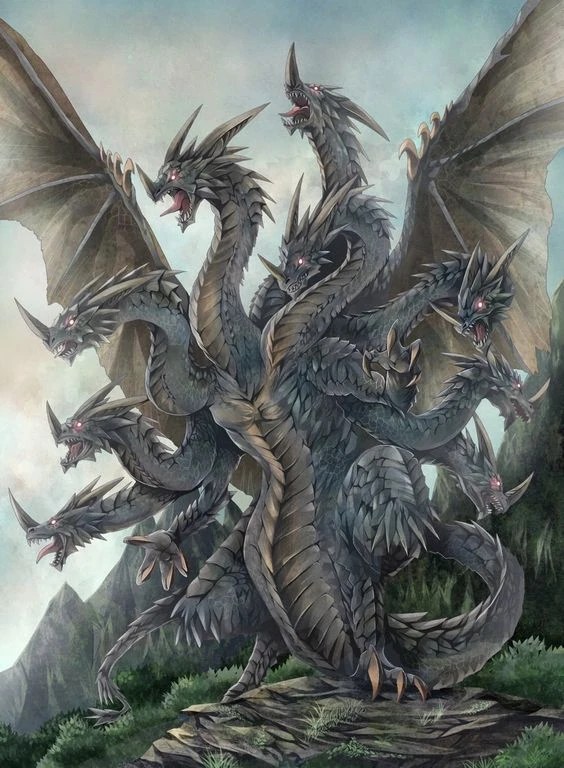Dragons, those mythical serpentine creatures of fire and fury, often capture our imaginations. But what happens when you amplify their power and mystique by adding multiple heads? What is a dragon with multiple heads called? This question ignites a journey into the depths of folklore and fantasy, revealing a rich tapestry of names and narratives.
The most common term for a multi-headed dragon is the "Hydra," borrowed from Greek mythology. This fearsome beast, famed for its regenerative abilities – for every head severed, two more would grow – has become synonymous with multi-headed dragons in general. However, the term "polycephalous dragon" also offers a more scientific, descriptive label, derived from Greek roots meaning "many-headed."
Beyond the Hydra, different cultures boast their own unique variations of the multi-headed dragon. In Slavic folklore, the "Zmey" is a multi-headed dragon, often depicted with multiple heads that can be severed, although they don't regenerate. Japanese mythology features the "Yamata no Orochi," an eight-headed, eight-tailed serpent slain by the god Susanoo. These varied portrayals speak to the universality of the multi-headed dragon motif.
The origin of the multi-headed dragon motif is likely rooted in humanity's fascination with and fear of reptiles, combined with the desire to create symbols of immense power and chaos. The multiple heads often signify increased strength, resilience, or even different aspects of nature. In some narratives, each head might possess a unique ability, making the creature even more formidable.
The significance of multi-headed dragons extends beyond mythology and into literature, art, and popular culture. They represent ultimate challenges, requiring cunning and heroism to overcome. From video games to fantasy novels, the multi-headed dragon continues to serve as a compelling antagonist, its many heads symbolizing the multifaceted nature of evil and the difficulty in achieving victory.
The Hydra, arguably the most famous multi-headed dragon, offers a powerful example. Its regenerative abilities present a unique challenge: brute force alone cannot defeat it. Hercules, tasked with slaying the Hydra, had to cauterize each wound after severing a head, preventing regrowth. This myth highlights the need for strategic thinking and ingenuity when facing seemingly insurmountable obstacles.
Another well-known example is the Yamata no Orochi. The story of its defeat by Susanoo involves trickery and intoxicating the dragon with sake before slaying it. This narrative emphasizes the importance of cunning and using the enemy's weaknesses to one's advantage.
Advantages and Disadvantages of Multi-Headed Dragons (in Fiction)
| Advantages | Disadvantages |
|---|---|
| Increased Power and Resilience | Potential Internal Conflict |
| Multiple Abilities | Greater Target Area |
| Symbolic Representation of Chaos | Logistical Challenges (Movement, Coordination) |
Frequently Asked Questions about Multi-Headed Dragons:
1. What is the most common name for a multi-headed dragon? Hydra.
2. What does polycephalous mean? Many-headed.
3. What is a Zmey? A multi-headed dragon from Slavic folklore.
4. What is the Yamata no Orochi? An eight-headed dragon from Japanese mythology.
5. Why are multi-headed dragons used in stories? To represent powerful and challenging antagonists.
6. How did Hercules defeat the Hydra? By cauterizing the wounds after severing each head.
7. How did Susanoo defeat the Yamata no Orochi? By intoxicating it with sake.
8. What symbolizes multiple heads of a dragon? Increased strength, different abilities, and aspects of chaos.
Tips and tricks for writing about multi-headed dragons: Research different mythological variations for inspiration, consider each head's individual personality and powers, and explore the symbolic implications of multiple heads.
In conclusion, the multi-headed dragon, whether a Hydra, Zmey, or another variation, remains a potent symbol across cultures and throughout history. Its many heads represent not just increased power, but also the complex challenges life throws our way. Understanding the diverse origins and interpretations of this fascinating creature enriches our appreciation of its enduring presence in mythology, literature, and art. From ancient myths to modern fantasy, the multi-headed dragon continues to inspire awe and ignite our imaginations. By exploring the various names and narratives surrounding these mythical beasts, we gain a deeper understanding of their symbolic significance and enduring appeal. Dive deeper into the lore surrounding these creatures and discover the rich tapestry of stories they inhabit.
what is a multi headed dragon called - Trees By Bike
what is a multi headed dragon called - Trees By Bike
what is a multi headed dragon called - Trees By Bike
what is a multi headed dragon called - Trees By Bike
what is a multi headed dragon called - Trees By Bike
Why Dungeons and Dragons doesn - Trees By Bike
what is a multi headed dragon called - Trees By Bike
what is a multi headed dragon called - Trees By Bike
what is a multi headed dragon called - Trees By Bike
what is a multi headed dragon called - Trees By Bike
what is a multi headed dragon called - Trees By Bike
Princess of Evil Dragons (Worm/D&D) [Taylor: Daughter of Tiamat] - Trees By Bike
what is a multi headed dragon called - Trees By Bike
what is a multi headed dragon called - Trees By Bike
Look No Further With Reaper - Trees By Bike










![Princess of Evil Dragons (Worm/D&D) [Taylor: Daughter of Tiamat]](https://i2.wp.com/pbs.twimg.com/media/E4ANsr5UcAc5W6c.jpg:large)


